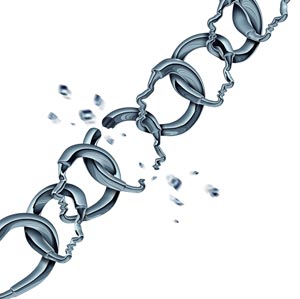Negative thinking
Negative thinking can be catastrophic to one’s mental, physical, emotional and spiritual health. It can also ruin marital happiness.
We can choose to think about positive things or we can dwell on the negative. Whatever is true, whatever is noble, whatever is right, whatever is pure, whatever is lovely, whatever is admirable are things worth thinking about. Look for the blessing in the midst of the burdens so that you can look at the burden in a new light. Negative-thinking people do the opposite: they find the smallest burden in the midst of any blessing and wring any possible joy out of life by saying that since life is less than perfect, life really stinks.
Joseph Sizoo, a well-known preacher in the early half of the twentieth century, calls people out on this: “Take it in the matter of health. Many there are who carry about frail bodies. Much of the day is spent in struggling against physical weakness. They emphasize what they have not, rather than the measure of health they still enjoy. In so doing they only increase their own misery and that of others. Live with the health that you still have.”
Negative thinking can also be financial. Writing shortly after the great depression, Sizoo said, “For multitudes the savings of a lifetime have been swept away. All that they have worked for in the years gone by has suddenly turned to ashes. But the pity of it is that they are forever rehearsing their adversity and reminding the world of what they no longer have. They seemingly forget that many things are still left to us: the sun still rises at its appointed time; the tides of the sea still run in ebb and flow; there is still brilliance in the stars, blue in the sky and color in the rose. Live by what you have, rather than by what you do not have.”“Live by what you have, rather than by what you do not have.” That wouldn’t be such a bad motto for life, would it?
No life is perfect. No life is even all that easy. Yes, some lives are easier than others, but choosing to dwell on the negative, obsess over the negative, wanting everyone to know just how hard it is for you or choosing to be a victim takes the joy out of life. It can also tear a marriage down.
Many people don’t want to hear this. But ask yourself, “How has my negativity served me, my family, and my friends in the previous years?” Has it made you feel better? Has it lessened your pain? Has it led to greater intimacy with others, or has it made your friends and loved ones want to leave you alone more often?
People want to enjoy life with you. They may not like the challenges or hard times that have happened to you (be it financial, relational, or physical), but they also want to enjoy you and the time you do have together. They want to enjoy the opportunities, possibilities and good times that you both have left. It might, indeed, hurt to smile sometimes but constant negativity may be hurting those around you and yourself more than you could possibly know. No life is easy. Every life is hard. Maybe yours seems particularly hard, but negative thinking will only take a tough life and make it worse. Consider the alternative to negative thinking. Respect yourself and those around you. Use your coping skills to deal with your problems and be grateful for everything else. Some days may seem long, but the years are short. Make the most of what you do have and look for the silver lining. You will feel better and have more energy to enjoy the beauty and good that is all around you.

 While this is an exciting time, and you are to be congratulated on moving in a positive direction, you also need to mentally and emotionally prepare yourself for the adjustment period right after your breakup, which is likely to present some challenges.
All breakups are difficult, but this type is often the hardest. You feel up, then down, over and over—it’s as much of a roller coaster as your relationship itself. Understanding the patterns you are likely to encounter can really help during the early months after a breakup with an emotionally manipulative person. Here’s a list of 10 common patterns plus ways to cope with each one:
While this is an exciting time, and you are to be congratulated on moving in a positive direction, you also need to mentally and emotionally prepare yourself for the adjustment period right after your breakup, which is likely to present some challenges.
All breakups are difficult, but this type is often the hardest. You feel up, then down, over and over—it’s as much of a roller coaster as your relationship itself. Understanding the patterns you are likely to encounter can really help during the early months after a breakup with an emotionally manipulative person. Here’s a list of 10 common patterns plus ways to cope with each one:
 I have always known that sugar triggers receptors similar to cocaine, heroine and other recreational drugs. Some clients in therapy tell me they are addicted to sugar. This informative and interesting article, validates how high amounts of sugar can be addictive and detrimental. I want to add that alcohol turns to sugar once absorbed in the blood system. Stay healthy for the holidays and keep in mind the effects of alcohol and sugar!
I have always known that sugar triggers receptors similar to cocaine, heroine and other recreational drugs. Some clients in therapy tell me they are addicted to sugar. This informative and interesting article, validates how high amounts of sugar can be addictive and detrimental. I want to add that alcohol turns to sugar once absorbed in the blood system. Stay healthy for the holidays and keep in mind the effects of alcohol and sugar!